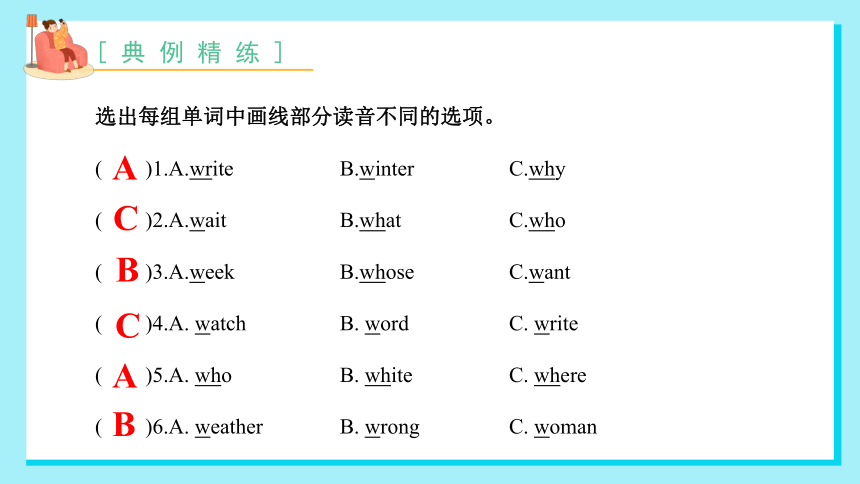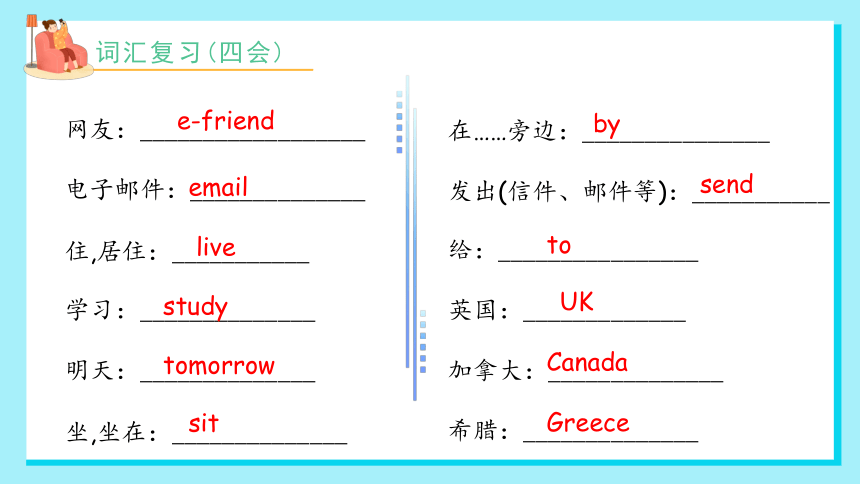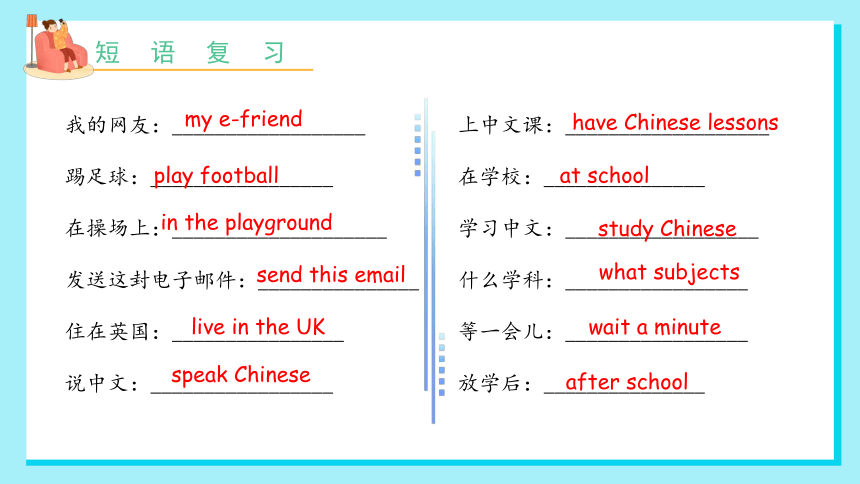Unit 6 My e-friend 复习课件(共33张PPT)-2024-2025学年译林版(三起)五年级英语上学期期末复习讲练测
文档属性
| 名称 | Unit 6 My e-friend 复习课件(共33张PPT)-2024-2025学年译林版(三起)五年级英语上学期期末复习讲练测 |

|
|
| 格式 | pptx | ||
| 文件大小 | 7.4MB | ||
| 资源类型 | 试卷 | ||
| 版本资源 | 牛津译林版 | ||
| 科目 | 英语 | ||
| 更新时间 | 2024-11-29 20:21:19 | ||
图片预览












文档简介
(共33张PPT)
译林版(三起)英语五年级上册期末复习
Unit 6
My e-friend
01
语 法 强 化
02
考 点 精 练
03
目 录
知 识 梳 理
PART 01
知 识 梳 理
字母“w”的发音
In winter, water turns to ice, 在冬天,水会变成冰
And sometimes it snows. 有时会下雪
So when the winter weather comes,所以当冬天的天气到来的时候
We always wear warm clothes! 我们总是穿暖和的衣服
读音指导
总结:w在单词开头发[w],如:week, wait, watch, well, water
拓展: 1.wh-在大多数情况下发[w], 字母h不发音,如:what, why, white, where
2.w不发音,如:①wh-后接o时,字母w不发音,字母h发/h/音,如:who, whom, whose
②wr-发[r],字母w不发音,如:write, wrong
③w不发音的特殊单词,如:two
字母“w”的发音
总结:w在单词开头发[w],如:week, wait, watch, well, water
拓展: 1.wh-在大多数情况下发[w], 字母h不发音,如:what, why, white, where
2.w不发音,如:①wh-后接o时,字母w不发音,字母h发/h/音,如:who, whom, whose
②wr-发[r],字母w不发音,如:write, wrong
③w不发音的特殊单词,如:two
[典例精练]
选出每组单词中画线部分读音不同的选项。
( )1.A.write B.winter C.why
( )2.A.wait B.what C.who
( )3.A.week B.whose C.want
( )4.A. watch B. word C. write
( )5.A. who B. white C. where
( )6.A. weather B. wrong C. woman
A
C
B
C
A
B
词汇复习(四会)
网友:__________________
电子邮件:______________
住,居住:___________
学习:______________
明天:______________
坐,坐在:______________
在……旁边:_______________
发出(信件、邮件等):___________
给:________________
英国:_____________
加拿大:______________
希腊:______________
e-friend
email
live
study
send
to
UK
by
tomorrow
sit
Canada
Greece
词汇复习(三会)
俄罗斯:_____________
中华人民共和国:_____________
美国:________________
钓鱼,捕鱼:_______________
等,等待:___________
Russia
PRC
US
fishing
wait
短语复习
我的网友:__________________
踢足球:_________________
在操场上:____________________
发送这封电子邮件:_______________
住在英国:________________
说中文:_________________
上中文课:___________________
在学校:_______________
学习中文:__________________
什么学科:_________________
等一会儿:_________________
放学后:_______________
my e-friend
play football
in the playground
send this email
have Chinese lessons
at school
study Chinese
what subjects
live in the UK
wait a minute
speak Chinese
after school
短语复习
吃鱼:__________________
去钓鱼:_________________
擅长钓鱼:____________________
坐在河边:_________________
穿暖和的衣服:________________
等了又等:_________________
写英文地址:___________________
在冬天:_______________
住在加拿大:__________________
教你:_________________
像这样:_________________
……岁:_______________
eat fish
go fishing
be good at fishing
sit by the river
write English addresses
in winter
live in Canada
teach you
wear warm clothes
like this
wait and wait
… years old
1. Let me send this email first. It's to my e-friend. 让我先发送这封电子邮件。它是给我的网友的。
2. He studies Chinese after school. 他放学后学习中文。
3.—Does he have Chinese lessons at school 他在学校上中文课吗 —No, he doesn't. 不,他不上。
4. —Does he like playing football 他喜欢踢足球吗 —Yes, he does. 是的,他喜欢。
句型复习
1. Let me send this email first. It's to my e-friend.
让我先发送这封电子邮件。它是给我的网友的。
2. He studies Chinese after school.
他放学后学习中文。
3.—Does he have Chinese lessons at school 他在学校上中文课吗
—No, he doesn't. 不,他不上。
4. —Does he like playing football 他喜欢踢足球吗
—Yes, he does. 是的,他喜欢。
1. Let me send this email first. It's to my e-friend. 让我先发送这封电子邮件。它是给我的网友的。
2. He studies Chinese after school. 他放学后学习中文。
3.—Does he have Chinese lessons at school 他在学校上中文课吗 —No, he doesn't. 不,他不上。
4. —Does he like playing football 他喜欢踢足球吗 —Yes, he does. 是的,他喜欢。
句型复习
5. —Where does he live 他住在哪里
—He lives in the UK. 他住在英国。
6.—What subjects does he like 他喜欢什么科目
—He likes Maths and PE. 他喜欢数学和体育。
7. I'm not good at fishing. 我不擅长钓鱼。
8. Don't worry. 别担心。
PART 02
语法强化
语法1:一般现在时的一般疑问句
一般现在时的一般疑问句是指询问是否属实的句子,一般只用 yes或 no 来回答。通常存在三种情况:
1. be动词( am/ is/ are)引导的一般疑问句:
句中含 be动词的陈述句变一般疑问句时要将 be放在句子开头,具体结构为:
—Be动词+主语+其他
—Yes,主语+ be动词./ No,主语+ be动词+ not.
如:(1)—Are you a student 你是一名学生吗
—Yes, I am./ No,I am not.是的,我是。/不,我不是。
(2)—Is she happy 她开心吗
—Yes, she is./ No, she isn't.是的,她开心。/不,她不开心。
2.含实义动词的一般疑问句:
句中的谓语动词为实义动词时,变一般疑问句要在句子开头加助动词 Do/Does,句中的动词要改为原形,具体结构为:
—Do/ Does+主语+动词原形(+其他)
—Yes,主语+ do( es)./ No,主语+ do( es)+ not.
如:—Do you like apples 你喜欢苹果吗
—Yes,I do.是的,我喜欢。
3.情态动词( can/ would/ should...)引导的一般疑问句:
句中含情态动词的陈述句变一般疑问句时要将情态动词提前,具体结构为:
—情态动词+主语+动词原形(+其他)
—Yes,主语+情态动词./ No,主语+情态动词+ not.
如:—Can you play basketball 你会打篮球吗
—No,I can't.不,我不会。
[典例精练]
单项选择。
( )1.—________ Helen ________ from the UK
—No. She is from the US.
A. Does; comes B. Does; come C. Do; comes
( )2. ________ your sisters ________ English on Sunday
A. Do; study B. Does; study C. Do; studies
B
A
( )3.—________ his uncle ________ nice food —Yes, he can.
A. Can; cooks B. Can; cook C. Can; cooks
( )4.—________ you like watching films
—No, I ________.
A. Do; do B. Do; don't C. Does; don't
( )5. ________ your father a policeman
A. Does B. Are C. Is
B
B
C
特殊疑问句是以特殊疑问词开头,对句子中的某一成分
提问的句子。
where, who, what, whose, why, which, when, how 等。
二、常用的疑问词:
一、概念:
语法2:一般现在时的特殊疑问句
三、特殊疑问句的语序:
1.如果疑问词作主语或主语的定语,则语序是陈述句语序。
如:(1)—Who is in the classroom 谁在教室里
—Tim蒂姆。
(2)—Whose bike is black 谁的自行车是黑色的
—Liu Tao's.刘涛的(自行车)。
什么是网络成瘾
2.如果疑问词作其他成分,则语序为“特殊疑问词+ be动词/助动词/情态动词+主语(+其他) ”,即“特殊疑问词+一般疑问句 ”。
如:(1) What can you do 你会做什么
(2) What does she like 她喜欢什么
(3) How is the soup 这个汤怎么样
(4) Where are you form 你来自哪里
(5) When do you get up 你什么时候起床
青少年为什么染上网瘾
★注意:回答特殊疑问句时,不能用 yes或者 no,而应该问什么答什么。
如:(1)—Why do you like pandas 你为什么喜欢熊猫
—Because They're cute.因为它们可爱。
(2)—Who is hungry 谁饿了 —Helen.海伦。
(3)—Where's your school 你的学校在哪儿
—Near Renmin Park.在人民公园附近。
注意:
[典例精练]
一、用正确的特殊疑问词完成句子。
1.—________ colour do the children like best
—Red.
2.—________ is that man
—He is Uncle Li.
3.—________ sweater is this
—It's Su Hai's.
4.—________ do you come to school
—By bike.
What
Who
Whose
How
[典例精练]
二、按要求完成句子。
1. Liu Tao likes Art.(对画线部分提问)
________ ________ ________ Liu Tao________
2. My father works in a car factory.(对画线部分提问)
________ ________ your father ________
3. Mr Green teaches us English.(对画线部分提问)
________ ________ Mr Green ________
4. I get up at six every day. (对画线部分提问)
________ ________ you get up every day
What subjects does
like
Where does
work
What does
teach
When do
语法3:介词to的用法
解析:该句中的 to表示“给”,后面接名词或人称代词的宾格形式。 和to相关的常用短语有:from ... to ...(从……到…) , give sth. to sb.(把某物给某人),send sth. to sb.(把某物发送给某人),show sth. to sb.(向某人展示某物)。
例如:We go to school from Monday to Friday.
I want to send this email to my cousin.
Can you show your new storybook to me
用to或for填空。
1. This letter(信)is _________ my grandma.
2. Please give this rubber _________ Liu Tao.
3. —This robot is _________ you. —Thank you.
[典例精练]
用to或for填空。
1. This letter(信)is _________ my grandma.
2. Please give this rubber _________ Liu Tao.
3. —This robot is _________ you. —Thank you.
to
to
for
PART 03
考点精练
一、根据首字母或图片提示,补全句子或对话。
1.—Let's go and play table tennis. —Wait a m________.
2. Let me send this e________ first.
3. My uncle 1________ in Shanghai with my grandparents.
4. Can Wang Bing speak E________
5.—What s________ do you like —I like ________ and ________.
inute
mail
ives
nglish
ubjects
Chinese
Maths
二、用所给单词的适当形式填空。
1. Mike can speak a little(一点) ________( China).
2. Ben's hobby is ________( make) model(模型) planes(飞机).
3. My sister often ________( study) English after school.
4. Helen is twelve ________( year) old.
5. My aunt doesn't ________( work) on Saturday or Sunday.
Chinese
making
studies
years
work
三、单项选择。
( )1. Let me send this email. It's ________ my e-friend.
A. to B. from C. with
( )2.—Do you like ________ —No, I________.
A. swimming; do B. swimming; don't C. swim; don't
( )3.—Can John ________ Chinese —Yes, he ________ Chinese after school.
A. speaks; studies B. speak; study C. speak; studies
( )4. What subjects ________ your sister study ________ school
A. do; in B. do; on C. does; at
A
B
C
C
四、按要求完成下列句子。
1. Liu Tao's father has a new car.(改为一般疑问句)
________ Liu Tao's father ________a new car
2. He likes PE.(改为否定句)
He ________ ________ PE.
3. Mr Green comes from Russia.(改为同义句)
Mr Green ________ ________ Russia.
4. I often study English by listening to the radio.(用 my sister 代替Ⅰ改写句子)
My sister ________ ________ English by listening to the radio.
5. Liu Tao lives in the UK.(对画线部分提问)
________ ________ Liu Tao ________
Does
have
doesn't like
is from
often studies
Where does
live
五、根据首字母或中文提示,补全对话。
Fred: Hi, Mary.
Mary: Hi, Fred. Do you have an e________
Fred: Yes, I do. H________ name is Frank.
Mary: Does he live in the UK
Fred: No. He c________ from Canada, but now he l________ in G________(希腊).
Mary: Can he speak E________
Fred: Yes. And he can speak C________ too.
Mary: Does he like playing b________
Fred: No, he d________. He likes playing f________.
-friend
is
omes
ives
reece
nglish
hinese
asketball
oesn't
ootball
谢谢
译林版(三起)英语五年级上册期末复习
译林版(三起)英语五年级上册期末复习
Unit 6
My e-friend
01
语 法 强 化
02
考 点 精 练
03
目 录
知 识 梳 理
PART 01
知 识 梳 理
字母“w”的发音
In winter, water turns to ice, 在冬天,水会变成冰
And sometimes it snows. 有时会下雪
So when the winter weather comes,所以当冬天的天气到来的时候
We always wear warm clothes! 我们总是穿暖和的衣服
读音指导
总结:w在单词开头发[w],如:week, wait, watch, well, water
拓展: 1.wh-在大多数情况下发[w], 字母h不发音,如:what, why, white, where
2.w不发音,如:①wh-后接o时,字母w不发音,字母h发/h/音,如:who, whom, whose
②wr-发[r],字母w不发音,如:write, wrong
③w不发音的特殊单词,如:two
字母“w”的发音
总结:w在单词开头发[w],如:week, wait, watch, well, water
拓展: 1.wh-在大多数情况下发[w], 字母h不发音,如:what, why, white, where
2.w不发音,如:①wh-后接o时,字母w不发音,字母h发/h/音,如:who, whom, whose
②wr-发[r],字母w不发音,如:write, wrong
③w不发音的特殊单词,如:two
[典例精练]
选出每组单词中画线部分读音不同的选项。
( )1.A.write B.winter C.why
( )2.A.wait B.what C.who
( )3.A.week B.whose C.want
( )4.A. watch B. word C. write
( )5.A. who B. white C. where
( )6.A. weather B. wrong C. woman
A
C
B
C
A
B
词汇复习(四会)
网友:__________________
电子邮件:______________
住,居住:___________
学习:______________
明天:______________
坐,坐在:______________
在……旁边:_______________
发出(信件、邮件等):___________
给:________________
英国:_____________
加拿大:______________
希腊:______________
e-friend
live
study
send
to
UK
by
tomorrow
sit
Canada
Greece
词汇复习(三会)
俄罗斯:_____________
中华人民共和国:_____________
美国:________________
钓鱼,捕鱼:_______________
等,等待:___________
Russia
PRC
US
fishing
wait
短语复习
我的网友:__________________
踢足球:_________________
在操场上:____________________
发送这封电子邮件:_______________
住在英国:________________
说中文:_________________
上中文课:___________________
在学校:_______________
学习中文:__________________
什么学科:_________________
等一会儿:_________________
放学后:_______________
my e-friend
play football
in the playground
send this email
have Chinese lessons
at school
study Chinese
what subjects
live in the UK
wait a minute
speak Chinese
after school
短语复习
吃鱼:__________________
去钓鱼:_________________
擅长钓鱼:____________________
坐在河边:_________________
穿暖和的衣服:________________
等了又等:_________________
写英文地址:___________________
在冬天:_______________
住在加拿大:__________________
教你:_________________
像这样:_________________
……岁:_______________
eat fish
go fishing
be good at fishing
sit by the river
write English addresses
in winter
live in Canada
teach you
wear warm clothes
like this
wait and wait
… years old
1. Let me send this email first. It's to my e-friend. 让我先发送这封电子邮件。它是给我的网友的。
2. He studies Chinese after school. 他放学后学习中文。
3.—Does he have Chinese lessons at school 他在学校上中文课吗 —No, he doesn't. 不,他不上。
4. —Does he like playing football 他喜欢踢足球吗 —Yes, he does. 是的,他喜欢。
句型复习
1. Let me send this email first. It's to my e-friend.
让我先发送这封电子邮件。它是给我的网友的。
2. He studies Chinese after school.
他放学后学习中文。
3.—Does he have Chinese lessons at school 他在学校上中文课吗
—No, he doesn't. 不,他不上。
4. —Does he like playing football 他喜欢踢足球吗
—Yes, he does. 是的,他喜欢。
1. Let me send this email first. It's to my e-friend. 让我先发送这封电子邮件。它是给我的网友的。
2. He studies Chinese after school. 他放学后学习中文。
3.—Does he have Chinese lessons at school 他在学校上中文课吗 —No, he doesn't. 不,他不上。
4. —Does he like playing football 他喜欢踢足球吗 —Yes, he does. 是的,他喜欢。
句型复习
5. —Where does he live 他住在哪里
—He lives in the UK. 他住在英国。
6.—What subjects does he like 他喜欢什么科目
—He likes Maths and PE. 他喜欢数学和体育。
7. I'm not good at fishing. 我不擅长钓鱼。
8. Don't worry. 别担心。
PART 02
语法强化
语法1:一般现在时的一般疑问句
一般现在时的一般疑问句是指询问是否属实的句子,一般只用 yes或 no 来回答。通常存在三种情况:
1. be动词( am/ is/ are)引导的一般疑问句:
句中含 be动词的陈述句变一般疑问句时要将 be放在句子开头,具体结构为:
—Be动词+主语+其他
—Yes,主语+ be动词./ No,主语+ be动词+ not.
如:(1)—Are you a student 你是一名学生吗
—Yes, I am./ No,I am not.是的,我是。/不,我不是。
(2)—Is she happy 她开心吗
—Yes, she is./ No, she isn't.是的,她开心。/不,她不开心。
2.含实义动词的一般疑问句:
句中的谓语动词为实义动词时,变一般疑问句要在句子开头加助动词 Do/Does,句中的动词要改为原形,具体结构为:
—Do/ Does+主语+动词原形(+其他)
—Yes,主语+ do( es)./ No,主语+ do( es)+ not.
如:—Do you like apples 你喜欢苹果吗
—Yes,I do.是的,我喜欢。
3.情态动词( can/ would/ should...)引导的一般疑问句:
句中含情态动词的陈述句变一般疑问句时要将情态动词提前,具体结构为:
—情态动词+主语+动词原形(+其他)
—Yes,主语+情态动词./ No,主语+情态动词+ not.
如:—Can you play basketball 你会打篮球吗
—No,I can't.不,我不会。
[典例精练]
单项选择。
( )1.—________ Helen ________ from the UK
—No. She is from the US.
A. Does; comes B. Does; come C. Do; comes
( )2. ________ your sisters ________ English on Sunday
A. Do; study B. Does; study C. Do; studies
B
A
( )3.—________ his uncle ________ nice food —Yes, he can.
A. Can; cooks B. Can; cook C. Can; cooks
( )4.—________ you like watching films
—No, I ________.
A. Do; do B. Do; don't C. Does; don't
( )5. ________ your father a policeman
A. Does B. Are C. Is
B
B
C
特殊疑问句是以特殊疑问词开头,对句子中的某一成分
提问的句子。
where, who, what, whose, why, which, when, how 等。
二、常用的疑问词:
一、概念:
语法2:一般现在时的特殊疑问句
三、特殊疑问句的语序:
1.如果疑问词作主语或主语的定语,则语序是陈述句语序。
如:(1)—Who is in the classroom 谁在教室里
—Tim蒂姆。
(2)—Whose bike is black 谁的自行车是黑色的
—Liu Tao's.刘涛的(自行车)。
什么是网络成瘾
2.如果疑问词作其他成分,则语序为“特殊疑问词+ be动词/助动词/情态动词+主语(+其他) ”,即“特殊疑问词+一般疑问句 ”。
如:(1) What can you do 你会做什么
(2) What does she like 她喜欢什么
(3) How is the soup 这个汤怎么样
(4) Where are you form 你来自哪里
(5) When do you get up 你什么时候起床
青少年为什么染上网瘾
★注意:回答特殊疑问句时,不能用 yes或者 no,而应该问什么答什么。
如:(1)—Why do you like pandas 你为什么喜欢熊猫
—Because They're cute.因为它们可爱。
(2)—Who is hungry 谁饿了 —Helen.海伦。
(3)—Where's your school 你的学校在哪儿
—Near Renmin Park.在人民公园附近。
注意:
[典例精练]
一、用正确的特殊疑问词完成句子。
1.—________ colour do the children like best
—Red.
2.—________ is that man
—He is Uncle Li.
3.—________ sweater is this
—It's Su Hai's.
4.—________ do you come to school
—By bike.
What
Who
Whose
How
[典例精练]
二、按要求完成句子。
1. Liu Tao likes Art.(对画线部分提问)
________ ________ ________ Liu Tao________
2. My father works in a car factory.(对画线部分提问)
________ ________ your father ________
3. Mr Green teaches us English.(对画线部分提问)
________ ________ Mr Green ________
4. I get up at six every day. (对画线部分提问)
________ ________ you get up every day
What subjects does
like
Where does
work
What does
teach
When do
语法3:介词to的用法
解析:该句中的 to表示“给”,后面接名词或人称代词的宾格形式。 和to相关的常用短语有:from ... to ...(从……到…) , give sth. to sb.(把某物给某人),send sth. to sb.(把某物发送给某人),show sth. to sb.(向某人展示某物)。
例如:We go to school from Monday to Friday.
I want to send this email to my cousin.
Can you show your new storybook to me
用to或for填空。
1. This letter(信)is _________ my grandma.
2. Please give this rubber _________ Liu Tao.
3. —This robot is _________ you. —Thank you.
[典例精练]
用to或for填空。
1. This letter(信)is _________ my grandma.
2. Please give this rubber _________ Liu Tao.
3. —This robot is _________ you. —Thank you.
to
to
for
PART 03
考点精练
一、根据首字母或图片提示,补全句子或对话。
1.—Let's go and play table tennis. —Wait a m________.
2. Let me send this e________ first.
3. My uncle 1________ in Shanghai with my grandparents.
4. Can Wang Bing speak E________
5.—What s________ do you like —I like ________ and ________.
inute
ives
nglish
ubjects
Chinese
Maths
二、用所给单词的适当形式填空。
1. Mike can speak a little(一点) ________( China).
2. Ben's hobby is ________( make) model(模型) planes(飞机).
3. My sister often ________( study) English after school.
4. Helen is twelve ________( year) old.
5. My aunt doesn't ________( work) on Saturday or Sunday.
Chinese
making
studies
years
work
三、单项选择。
( )1. Let me send this email. It's ________ my e-friend.
A. to B. from C. with
( )2.—Do you like ________ —No, I________.
A. swimming; do B. swimming; don't C. swim; don't
( )3.—Can John ________ Chinese —Yes, he ________ Chinese after school.
A. speaks; studies B. speak; study C. speak; studies
( )4. What subjects ________ your sister study ________ school
A. do; in B. do; on C. does; at
A
B
C
C
四、按要求完成下列句子。
1. Liu Tao's father has a new car.(改为一般疑问句)
________ Liu Tao's father ________a new car
2. He likes PE.(改为否定句)
He ________ ________ PE.
3. Mr Green comes from Russia.(改为同义句)
Mr Green ________ ________ Russia.
4. I often study English by listening to the radio.(用 my sister 代替Ⅰ改写句子)
My sister ________ ________ English by listening to the radio.
5. Liu Tao lives in the UK.(对画线部分提问)
________ ________ Liu Tao ________
Does
have
doesn't like
is from
often studies
Where does
live
五、根据首字母或中文提示,补全对话。
Fred: Hi, Mary.
Mary: Hi, Fred. Do you have an e________
Fred: Yes, I do. H________ name is Frank.
Mary: Does he live in the UK
Fred: No. He c________ from Canada, but now he l________ in G________(希腊).
Mary: Can he speak E________
Fred: Yes. And he can speak C________ too.
Mary: Does he like playing b________
Fred: No, he d________. He likes playing f________.
-friend
is
omes
ives
reece
nglish
hinese
asketball
oesn't
ootball
谢谢
译林版(三起)英语五年级上册期末复习
